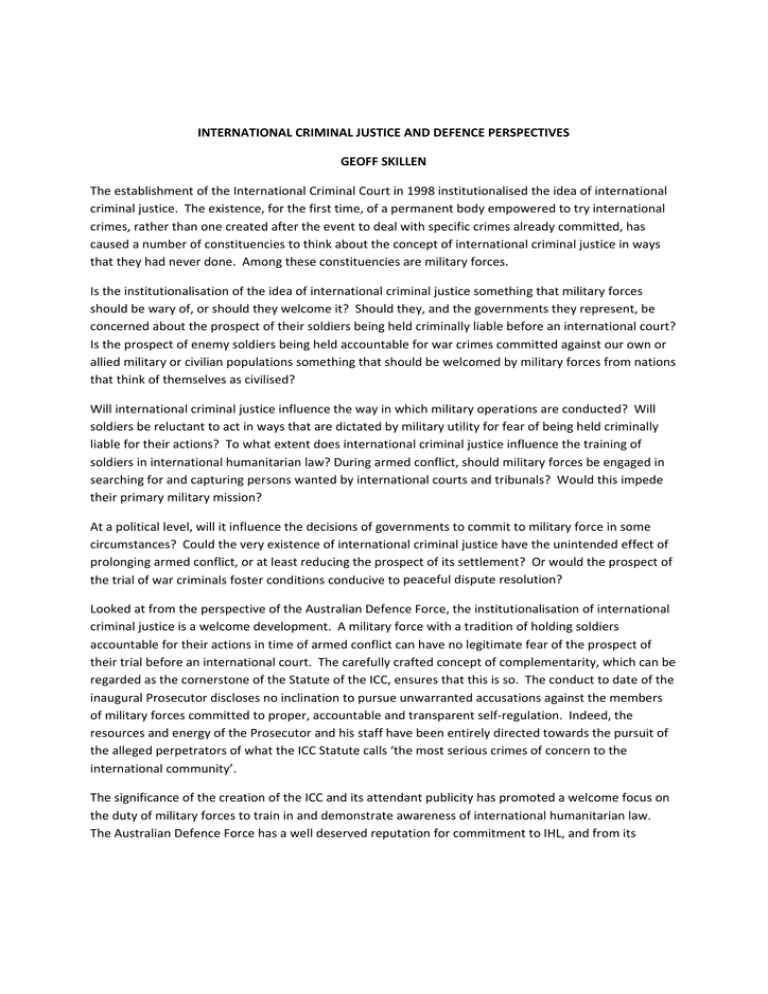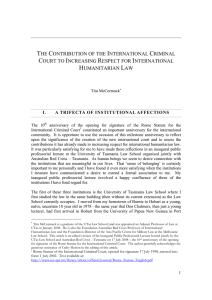INTERNATIONAL CRIMINAL JUSTICE AND DEFENCE PERSPECTIVES GEOFF SKILLEN
advertisement

INTERNATIONAL CRIMINAL JUSTICE AND DEFENCE PERSPECTIVES GEOFF SKILLEN The establishment of the International Criminal Court in 1998 institutionalised the idea of international criminal justice. The existence, for the first time, of a permanent body empowered to try international crimes, rather than one created after the event to deal with specific crimes already committed, has caused a number of constituencies to think about the concept of international criminal justice in ways that they had never done. Among these constituencies are military forces. Is the institutionalisation of the idea of international criminal justice something that military forces should be wary of, or should they welcome it? Should they, and the governments they represent, be concerned about the prospect of their soldiers being held criminally liable before an international court? Is the prospect of enemy soldiers being held accountable for war crimes committed against our own or allied military or civilian populations something that should be welcomed by military forces from nations that think of themselves as civilised? Will international criminal justice influence the way in which military operations are conducted? Will soldiers be reluctant to act in ways that are dictated by military utility for fear of being held criminally liable for their actions? To what extent does international criminal justice influence the training of soldiers in international humanitarian law? During armed conflict, should military forces be engaged in searching for and capturing persons wanted by international courts and tribunals? Would this impede their primary military mission? At a political level, will it influence the decisions of governments to commit to military force in some circumstances? Could the very existence of international criminal justice have the unintended effect of prolonging armed conflict, or at least reducing the prospect of its settlement? Or would the prospect of the trial of war criminals foster conditions conducive to peaceful dispute resolution? Looked at from the perspective of the Australian Defence Force, the institutionalisation of international criminal justice is a welcome development. A military force with a tradition of holding soldiers accountable for their actions in time of armed conflict can have no legitimate fear of the prospect of their trial before an international court. The carefully crafted concept of complementarity, which can be regarded as the cornerstone of the Statute of the ICC, ensures that this is so. The conduct to date of the inaugural Prosecutor discloses no inclination to pursue unwarranted accusations against the members of military forces committed to proper, accountable and transparent self‐regulation. Indeed, the resources and energy of the Prosecutor and his staff have been entirely directed towards the pursuit of the alleged perpetrators of what the ICC Statute calls ‘the most serious crimes of concern to the international community’. The significance of the creation of the ICC and its attendant publicity has promoted a welcome focus on the duty of military forces to train in and demonstrate awareness of international humanitarian law. The Australian Defence Force has a well deserved reputation for commitment to IHL, and from its perspective, the institutionalisation of international criminal justice can only be viewed as a welcome development.






